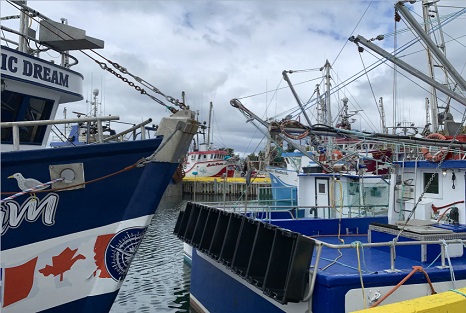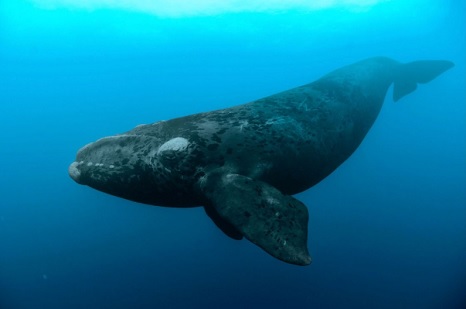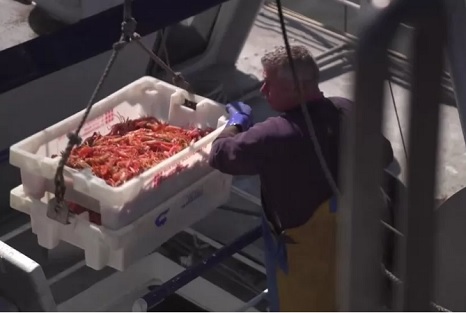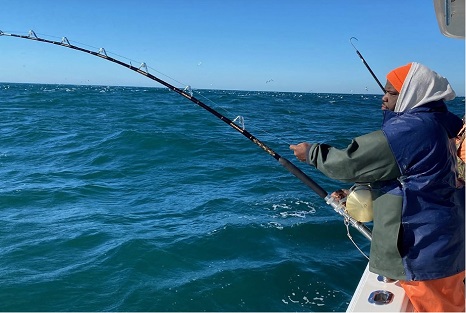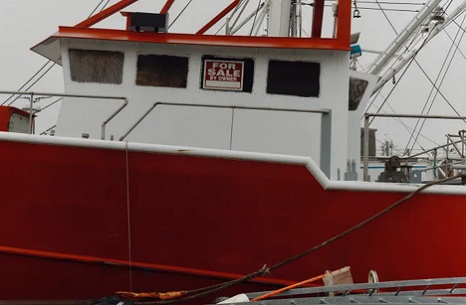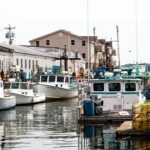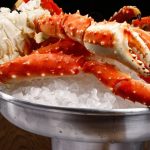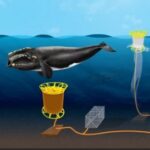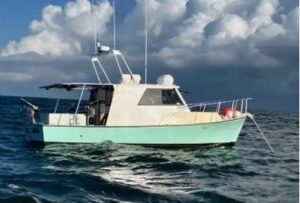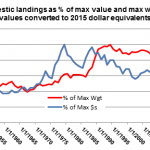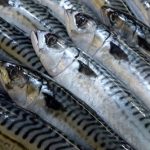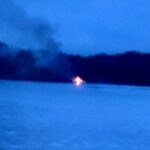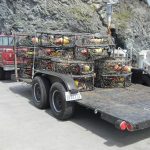Category Archives: Featured
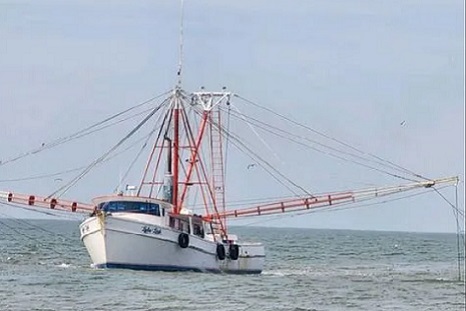
Beaufort County shrimpers netting big white shrimp as season opens. ‘Thankful everyday’
Craig Reaves loves his office: The southern coastal waters of the Atlantic Ocean. The owner of Beaufort-based Sea Eagle Market was among 20 shrimp boat captains who were at work Thursday, plying the waters near Pritchards Inlet near Fripp Island. It was opening day of the commercial shrimp trawling season, which is a big deal in a state where shrimp is the favorite Seafood and cities name festivals in honor of the delicious crustaceans. Nets dragged the bottom of the ocean catching big early-season white roe-shrimp. When the fishing day is done, this variety will usually fetch higher prices. “We serve a mighty God so we’re thankful everyday we get to come to work every day in the ocean,” Reaves said. “Beautiful.” >click to read< 07:55
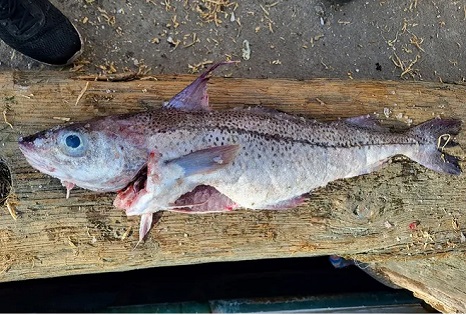
Coddock? How a new cod-haddock-like fish caught the attention of scientists
A strange thing occurred during the winter of 2022-23 and into this spring. An odd-looking fish has cropped up off and on mixed in with the haddock brought into Gulf of Maine ports. This was recently brought to my attention by Linda Hunt, who is a fish dealer for Coastline Seafood. Recently while filleting a load of haddock for the market, she found five fish that she couldn’t quite identify. She had seen a few during the winter and one the day before but finding five in 200 pounds of fish all at once seemed odd. She contacted us with a photo. Wow, what is this fish? It has the head of a haddock, the lateral line of a cod, the pectoral fin of a cod, and the meat flaked in large pieces like cod. The body shape is that of a haddock and all the other fins look like haddock fins. But it was missing the “thumbprint of God,”,,, >click to read< 07:40
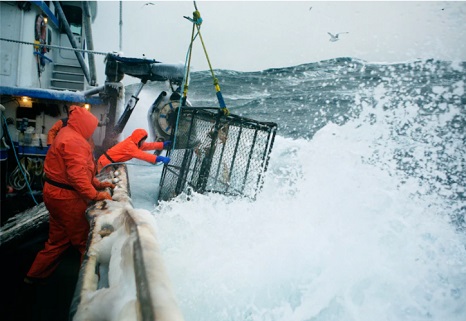
How Commercial Fisherman Corey Arnold Got Hooked On Fishing
Chris Arnold was an avocado grower and nurseryman, in Southern California, who bought a fishing boat when Corey was a toddler. He was reeling in baby sharks while still in diapers. “My dad was obviously busy with work and running a business, so fishing was a hobby for him,” says Arnold. “But I was 100 percent on fishing.” It was on a summer fishing trip to Alaska with his dad that Arnold first observed a commercial fishing operation — by 19, he had his first fishing job. He went on to work for seven years as a crab fisherman in Seattle, and eventually made his way to Alaska fishing for king crab on the F/V Rollo (featured on Season 2 of the Deadliest Catch) in the depths of winter, on the Bering Sea. Photos, >click to read< 11:15
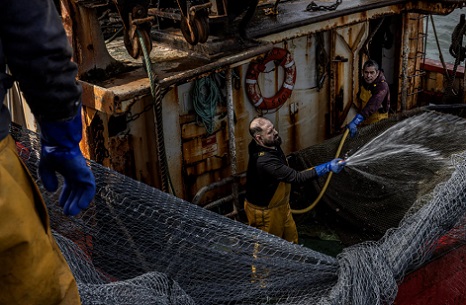
Death by a Thousand Cuts – ‘We Have Fish, That’s Our Currency’
Just before midnight, David O’Neill navigated his trawler into the harbor in Union Hall, a small port in southwestern Ireland, the wake from the vessel sending tiny waves slapping against the pier. The crew swiftly unloaded their catch, using a crane to lift ice-packed crates of haddock and hake from the hold of the Aquila under bright spotlights. Less than an hour later, the Aquila would depart for its final trip. Two days later, the crew stripped the vessel’s contents — chains, buoys, ropes, steel cables, and hooks — and ejected them onto the pier, on their way to a shipyard to be scrapped. “This is coming with me,” Mr. O’Neill said as he unscrewed the Aquila’s wooden steering wheel. “It reminds you of all you’ve been through on this boat.” Photos, >click to read< 10:20
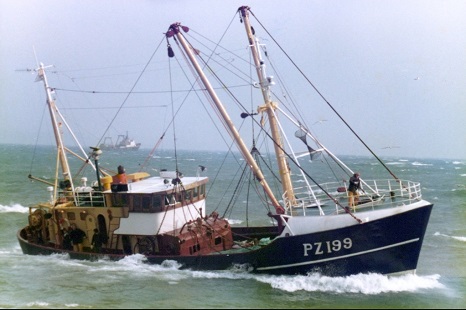
‘A’ is for Algrie, end of a fishing era.
A piece of fishing history left through the gaps this week on her way to be scrapped in Ghent, Belgium – the Algrie was the very first trawler purchased by the Stevenson family fishing firm to enter the harbour in 1976 and start was to become the the largest privately owned beam trawl fishing fleet in Europe. In 1982, the 70ft Algrie found her beam trawls attached to the nuclear attack sub HMS Spartan in the waters off Land’s End in 1982 and towed her for quite some time before the sub surfaced. Legend has it that, at first, the Navy via the coastguard, denied there was a submarine in the area! Video, Lots of photos, >click to read< 12:48
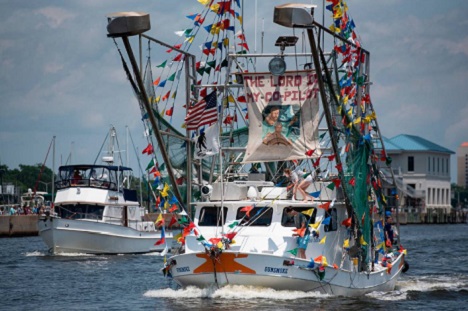
Biloxi: See photos as the 94th Blessing of the Fleet rings in the start of shrimping season
The sun was shining and the humidity was at a minimum as the shrimping season officially kicked off Sunday with the 94th annual Blessing of the Fleet in Biloxi. Two boats, the Captain Justin and Gunsmoke, were honored for their decorations with Captain Justin receiving first place in the boat decorating contest and Gunsmoke receiving the second place award. “Shrimp season is open. The blue economy is extremely important to the gulf coast,” said Mississippi Gov. Tate Reeves, who was briefly in attendance. “Literally we help feed not only Mississippi, but the world.” Lots of photos of boats and happy people! >click to view< 09:01
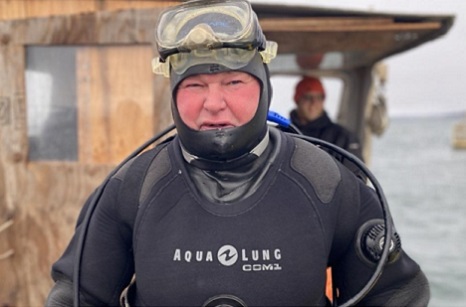
Green Gold Rush: What happened to Maine’s once-robust sea urchin industry?
In the United States’ easternmost city, you’ll find Paul Cox and his crew working early on the water. In late winter, they’re after a spikey, green, and otherwise inedible sea creature (besides the gonads): the green sea urchin. Alone and in often murky water that requires a flashlight, he scoops hundreds of pounds of sea urchin into yellow nets. His crew, Paul and Jevin, sort the urchin above water. Cox said he started to dive for sea urchin in the ’90s, not long before the state cut off any new licenses  to prospective fishermen. After the ’90s, no one could get a new sea urchin license. Now everyone who dives for urchin is in their 60s and 70s, with little hope on the horizon for new licenses seeing how the sea urchin has lost so much of its habitat because of climate change and invasive species. Photos,Video, >click to read< 10:54
to prospective fishermen. After the ’90s, no one could get a new sea urchin license. Now everyone who dives for urchin is in their 60s and 70s, with little hope on the horizon for new licenses seeing how the sea urchin has lost so much of its habitat because of climate change and invasive species. Photos,Video, >click to read< 10:54
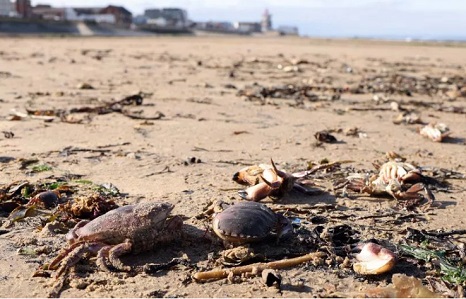
Fishing group’s list of over 100 reports of incidents and concerns since 2021 marine die-offs
Since October 2021, fishermen have been battling for the region’s ecosystem after swathes of dead crabs, lobsters, and shellfish washed up on beaches. Environmentalists and fishermen fought for answers – with the Department for Environment Food and Rural Affairs eventually launching a probe.While the initial Defra report said an algal bloom was the most likely cause, further investigations found that a “novel pathogen” was most likely to blame. Independent marine and university experts as well as the fishermen believed dredging on the Tees unearthed historical toxins leading to the mass die off – but this has also been ruled out by the authorities. Incident reports listed by the NEFC, and what a sad list it is, >click to read< 21:34
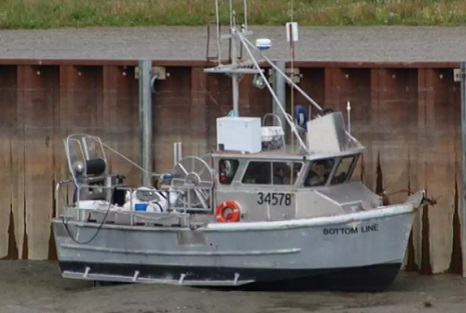
Wildlife Troopers to crack down on ‘performance-enhancing’ add-ons to Bristol Bay boats
Commercial drift gillnet boats must measure 32 feet or less to fish in the bay. And the fleet got a finger-wagging from the Alaska Wildlife Troopers earlier this year — a reminder to keep their boats within that limit. Wildlife trooper Capt. Aaron Frenzel said they fielded more complaints than usual about big vessels last year. So after the season, they went over to boat yards in King Salmon and Naknek to see what was going on. “A lot of the stuff is below the waterline that we can’t see… while we’re out on the water inspecting vessels,” he said. “So we started seeing some areas that just kind of expanded.” >click to read<, 18:40
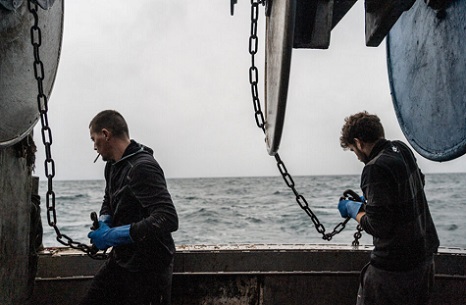
Farmers and Fishermen: In the Sweat of Their Brow
I tried to put my finger on the pulse of the world in order to understand what ties these farmers to their land and these fishermen to the sea. I went wherever life erupts: to a pasture where a farmer slowly prods his cattle along, into the shade of a stable… 3PM. I embark for the first time on board of the trawler Alcyon 2. Cézembre and Samy are mending the fish nets, while Thierry begins to maneuver. The anchor is raised. The lights of the port fade away little by little. In the cabin, Samy is brewing 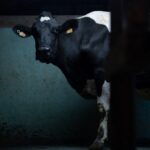 coffee. The down comforters are laid out for the night. 3AM. The sound of metal clanking under the chains. Samy and Cézembre take a few seconds to slip on their fishing gear before heading back to the stern. Back on land, at the La Vallée café in Quintin. The oldest of the farmers is leaning against the counter, a scarf pulled over his head. He is a regular. This is the local watering hole. The morning light timidly pierces the mist. Photos, >click to read< 17:54
coffee. The down comforters are laid out for the night. 3AM. The sound of metal clanking under the chains. Samy and Cézembre take a few seconds to slip on their fishing gear before heading back to the stern. Back on land, at the La Vallée café in Quintin. The oldest of the farmers is leaning against the counter, a scarf pulled over his head. He is a regular. This is the local watering hole. The morning light timidly pierces the mist. Photos, >click to read< 17:54

Future generations
I am the Son of James Everard and the nephew of the late Tom Best. I am a member of what once was the largest inshore fishing family in Petty Harbour known as the “Best Brothers” whom received bravery medals for risking their lives from the Order of Canada to save others who were in distress. Now it’s time we need your help to rebuild the inshore fishery here in Petty Harbour. All our licences are leaving the community to Large Boat fishing family’s because the rules in the professionalization program are designed to help them grow and in turn destroy us. >click to read< 18:07
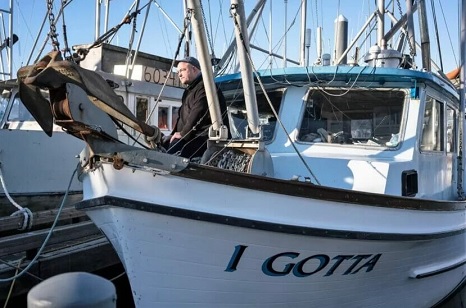
3 Alaska trollers contemplate a summer without chinook
Barring a stay, or a successful appeal, or other eleventh-hour legal action, there will be no troll fishery for king salmon in Southeast Alaska either this summer or winter. The fisheries have been canceled by order of the U.S. District Court of Western Washington on largely procedural grounds. According to the ruling they stem from a violation of the Endangered Species Act, and the failure of the National Marine Fisheries Service to fully address the impact of Alaska’s king salmon trollers on an endangered population of orcas in Puget Sound called Southern Resident killer whales. No other salmon species or commercial gear group or sport fishery anywhere on the entire Pacific Northwest coast is affected by the order, just commercial trolling for king salmon in Southeast Alaska. photos, >click to read/listen< 13:39
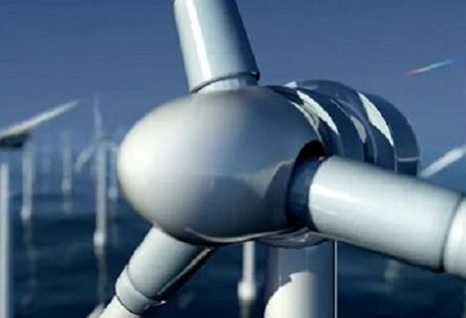
Wind project scope ‘staggering’
It wasn’t “until the whales and the dolphins started washing up that people’s attention was able to focus” on the offshore wind farms, according to Cindy Zipf, and when people looked beyond the whales, they realized what is happening is “staggering.” “I don’t think ever in the history of mankind have we proposed to industrialize an ecosystem this fast and at this magnitude,” she said. Zipf is executive director of Clean Ocean Action, a coalition of groups dedicated to protecting the ocean. Zipf acknowledges the pace at which the plans are moving forward is making efforts to slow or stop them difficult. “It’s challenging considering how fast-tracked everything is and how limited the permitting process is. It’s kind of under the jurisdiction of two people to make it happen, President Biden and Gov. Murphy,” she said. “Hopefully as more is understood there will be some more caution but as it is right now the (state and federal) agencies are very enthusiastic.” >click to read< 16:29
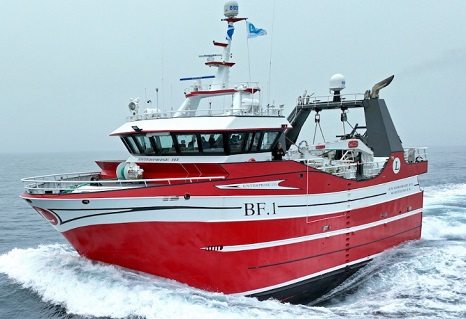
Enterprise III Joins the Fraserburgh Fleet
Enterprise III has been delivered to James Lovie and his partners, and is a Vestværftet design, outfitted and completed at the yard in Hvide Sande on a hull fabricated in Poland. The new trawler headed for Fraserburgh to start its fishing career and to make its first landings. Accommodation on board is for up to eleven and is fitted out to an exceptionally high standard. The deck is laid out with three trawl winches controlled by a Scantrol autotrawl, three pairs of sweepline winches at the head of the long trawl desk with drums large enough to spool ground gear, three net drums over the trawl lanes, pairs of bagging, outhaul and codend winches, and a forward mooring winch. Photos, >click to read< 17:37 and partners
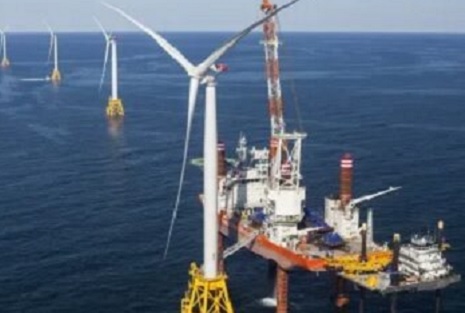
Where have all the dead whales gone? By Nils Stolpe, FishNet-USA
Beginning in December of last year and extending through most of the first quarter of 2023, New Jersey and New York beaches were inundated with abnormally high numbers of dead or dying whales and smaller marine mammals. These majestic creatures-though not so majestic when being pushed about willy-nilly by tides, wind, waves and various types of earth moving machines-have never expired in such large numbers in such publicly accessible locations in local residents’ memories. Perhaps coincidently, intensive hydroacoustic surveys to determine the suitability of potential sites for the construction of thousands of gigantic windmills and their supporting infrastructure (supposedly to help us all survive what is being sold as an imminent energy/climate crisis) were being committed offshore of the beaches where all of these marine mammal deaths and strandings have been concentrated. To us inveterate observers of that hunk of Atlantic Ocean real estate known as the New York Bight, and the critters that temporarily or permanently live there, and of the actions of the public agencies charged with-and entitled to tens of millions of taxpayer dollars each year to do so-administering the Endangered Species and the Marine Mammal Protection Acts, that surely hints at, at best, ineptitude at that’s ineptitude at a fairly advanced level. >click to read the article< 16:14
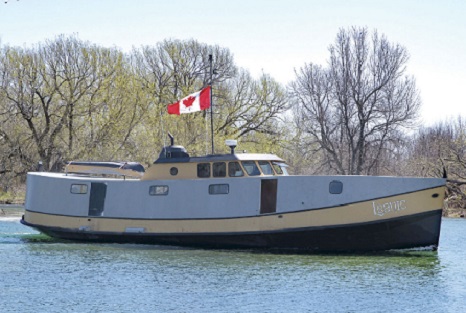
Master of the Leanic: Tim McCormack continues a tradition going back five generations
For Tim McCormack, life doesn’t get any better than being out on the lake in his fishing boat, the Leanic. He says that it’s his “happy place”. “I’ve been doing this since I was knee-high to a grasshopper,” he said. “My father was a fisherman and on my mother’s side my grandfather Mel McIntosh was a fisherman, and his grandfather David McIntosh was one of the first commercial fishermen in this area.” Tim learned the trade and the secrets of the lake from his father and grandfather, and he provided an analogy for his knowledge of the lake that is a little too colourful to print in a family newspaper. Now, he is passing that generational knowledge along to his son, Jordan, who is just a couple of exams away from obtaining his Captain’s licence. >click to read< 11:16
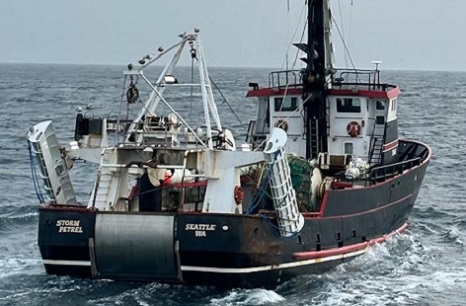
Tornados Make Bering Sea Debut
Seattle trawler Storm Petrel has finished its first trips using a pair of Tornado pelagic trawl doors from Vónin, and skipper Acácio DoMar has been impressed with how the new doors have handled. ‘They tow well, square well and shoot away well. They’re a great fit to what we do,’ he said, as the A-season for Alaska pollock was coming to an end. This is the 37-metre Storm Petrel’s main fishery. ‘We fish pollock for most of the year. There’s some codfish, but it’s a small season.’ The company did its homework ahead of investing in new doors, with Acácio DoMar’s fellow captain and fleet manager Dan Martin travelling to Scotland and other places to check out the latest technology. Photos, >click to read< 18:01
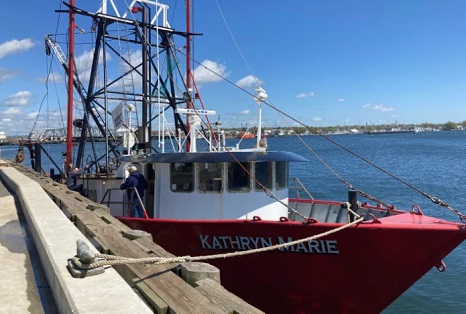
New Bedford’s fishing community is working with Vineyard Wind. Here’s how.
For Captain Tony Alvernaz, accepting a job doing safety work for Vineyard Wind has provided added income for his family and the families of the people who work for him. They are monitoring the work zone for Vineyard Wind as the company proceeds with turbine installation and at the same time are helping get the word out to other fishermen, according to Crista Bank, the fisheries manager at Vineyard Wind. Bank said the involvement of fishing vessels in the project is really important and that the same opportunities are offered to a single vessel owner, a scallop owner with a couple of boats or vessels that are up to international standards. “We’re trying to make sure we’re contracting with all different sized vessels and vessel owners,” she said. >click to read< 08:10
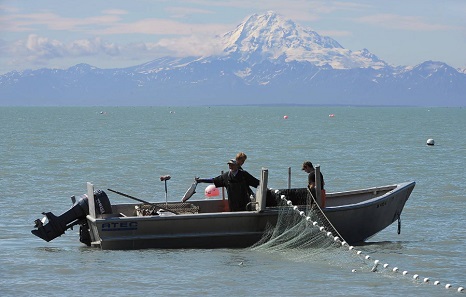
The end of an era for Alaska fishing may already be here
The historic Long Island fishing town of Amagansett is about 100 miles from New York City — roughly the distance from Ninilchik to Anchorage. Remarkably, a remnant commercial fishery continued on eastern Long Island into the 1980s, despite mounting pressure from urban growth, pollution and rival sport fishermen. This summer, Kenai Peninsula beaches from Ninilchik to Kenai will be empty of setnets and buoys. Family-run commerial fishing businesses, a major economic force in the Cook Inlet region since territorial days, have been shut down and may not be coming back. Exceptional sockeye runs of the 1980s, when setnetters on east-side beaches recorded a few million-dollar seasons, helped set the stage for Cook Inlet’s modern fish wars. Sportfishermen saw too many prize king salmon in fish totes headed to processors. As more permit-holders migrated to the east-side beaches, new efforts were launched to avoid Kenai River kings. >click to read< 15:40
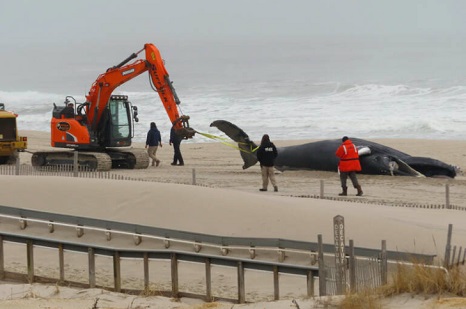
N.J. GOP seeks wind projects halt to see if whales benefit
Four state senators hosted a online hearing about offshore wind energy generation and whale deaths, three weeks after the most recent East Coast whale death was reported and despite the assurances of most scientists and conservationists that there is no correlation. The two-hour hearing came a week after Democrats, who control the Legislature and the governorship, held a similar hearing and many of New Jersey’s major environmental groups said the greatest danger to whales is climate change, not offshore wind generation. “I’ve been labeled a climate change denier and a tin-foil hat wearer,” said Jim Hutchinson, managing editor of The Fisherman,,, U.S. Rep. Frank Pallone Jr., who represents part of the Jersey Shore and who led last week’s Democratic-led forum, said pausing offshore wind projects wouldn’t prevent whale deaths. >click to read< 08:05
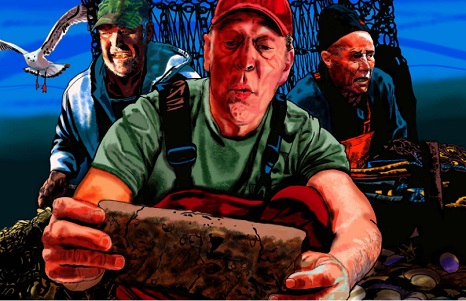
Smugglers dumped millions in drugs off Maine’s coast. Struggling fishermen saw a jackpot.
One cold night in April 1983, narcotics officers arrived at the Northeast Harbor Marina on Mount Desert Island. The drug-sniffing dog with them strained at the end of a leash. They’d received an anonymous tip that some of the scallop boats in the area had been carrying illegal drugs along with their catches. They waited in the shadows, preparing to pounce on the evidence that would confirm the rumors. Out on the dark waters, a 42-foot scallop dragger named F/V Joshua’s Delight glided toward the harbor. One of the fishermen aboard that night was my father, Frank Ryan, then 34. That night, my father hoped his luck was changing. But he wasn’t thinking about scallops. While dredging the ocean floor that afternoon, their nets had caught something else. When they hauled them up, among thousands of scallops were chunks of a sticky, leathery substance shaped like the sole of a shoe. Dense and potent, you could smell it the instant it came on deck: hashish. >click to read< 11:11
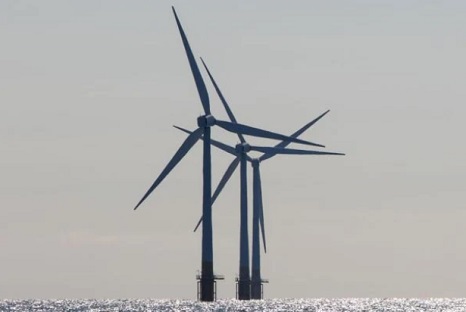
The New Green Activists Would Rather Save The Windmills Than Save The Whales
Save the whales. Once upon a time, that used to be the favorite mantra of environmental activists. Today, not so much. These days, it’s more chic to be into giant offshore wind turbines. And if dozens upon dozens of whales must be killed to make way for turbines along with their new mantra, “save the planet,” well, that’s just the price we must pay. Or so goes the current thinking among the green set. Scores of whale and dolphin carcasses have washed up along the East Coast in recent months, and particularly on New Jersey and New York-area beaches where no fewer than nine whales have washed ashore just since December. The evidence is not yet incontrovertible, but the deaths coincide with sonic testing in conjunction with massive wind turbine projects. >click to read< 08:28
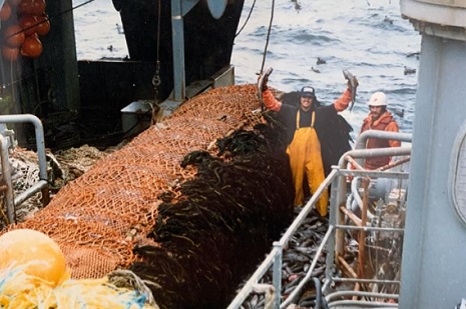
Who is Captain Sewall Maddocks?
Sewall’s love for the ocean first began when he was in grade school lobstering with his uncle Earl Brewer Sr. In 1977 he made his first trip on a trawler fishing with Richard McLellan on the F/V Sea Bring. He later became captain at 19 on the 82-foot F/V Irene’s Way, which was built for Richard at Goudy and Stevens in East Boothbay. In the early 80s, Sewall started to captain for F. J. O’Hara and Son’s out of Rockland, Maine He worked on the 110-foot F/V Alliance and later on the 119-foot F/V Araho, both stern trawlers, while fishing ground fish in the Gulf of Maine and on the northern edge of George’s Bank. Sewall later fished outside the 200 mile limit from Newfoundland on the tail of the Grand Banks. These boats typically had a crew of 5-6 people and caught 30,000-100,000 pounds of fish per trip with the fish being layered in ice in the fish hold. Great story! >click to read the rest< 10:22
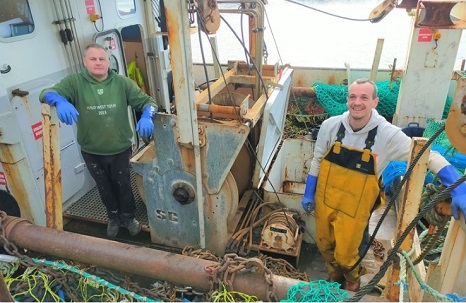
The hard life of a fisherman who wouldn’t change it for the world
Mark Ainsworth travels over 200 miles from Staffordshire to Plymouth’s Fish Quay, when he’s needed, to fish off the coast of Devon and Cornwall with experienced local skipper, Steven Walker. “Going to sea is a hard life, there are no ifs and buts,” said experienced long-term skipper, Steven Walker. Steve is used to early starts and is often accompanied by relatively new fisherman, Mark Ainsworth – helping him settle into the fishing life. Mark took up fishing just six months ago and he travels over 200 miles from Staffordshire to Plymouth’s Fish Quay, when he’s needed, to fish off the coast of Devon and Cornwall. Mark completed a Seafish course and joined Steven’s fishing boat just two months ago. >click to read< 08:18






